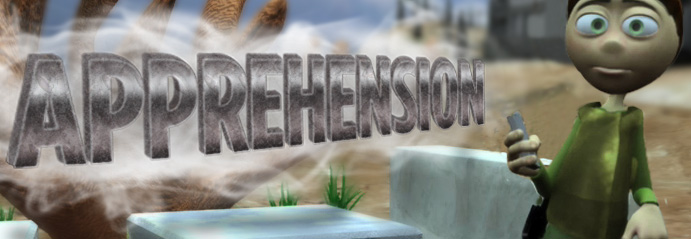 |
Animation Mentor:
How did you come up with the concept for your short film?
Ziv Kitlaro:
I remember the week I tried to come up with story ideas for the movie. I did a couple of free association thinking sessions, and that gave me a few nice ideas, but nothing that I really loved. Then I got sick with a high fever, and I was lying in bed, in a dark room – it was winter time, so there was rain outside. Suddenly, the main idea came to me and I instantly loved it. As an Israeli, the Israeli occupation (aka the Israeli-Palestinian conflict) is something that plays a big part of living here and getting a chance to do a movie about it was really exciting.
Animation Mentor:
What were the steps you took in your planning process?
Ziv Kitlaro:
There was a lot of planning involved because Animation Mentor structured it to be a full term on story development, animatic and layout. I think that on my own, I would have jumped ahead and tried to cut corners so I could animate, but I’ve learned that planning is key, and due to that, my life was a lot simpler when I started animating.
Animation Mentor:
Do you mind sharing some of the pre-production work with us with a little explanation of what we're looking at.
Ziv Kitlaro:
Getting the right idea for the film is critical in my opinion. The amount of time spent on creating such a film is huge, so you gotta love your project all the way to the end. Once I had the idea, I embellished and refined it to the max through pitching the story to friends, family, colleagues, Animation Mentor students – anyone who had a working ear and lacked the ability to run away from me :). Once you do that, you get a lot of feedback and you must not discard this feedback! I tried to use it as much as I could to improve the film. The stuff I discarded came back to bite me. It’s a lot more costly to fix something than to put it in correctly in the first place.
I also looked at a lot of reference materials regarding video, stills, props, environment – anything that was relevant. Music was also a major part of any movie and I was lucky to have a composer working on my short with me. Until he got on board, I was a bit stuck.
Animation Mentor:
What obstacles, if any, did you experience during the creation of your short film? How did you work your way around them?
Ziv Kitlaro:
The main obstacle was the short amount of time I had. I was working full time as a software development team leader, and when I got home from work, I wanted to be with my wife and daughter (she was a year old when I started working on the short) so I worked mostly at nights after my daughter fell asleep and I didn’t sleep much myself. Other than that, I had some technical difficulties with rigging the rifle to the hand of the soldier. There are a couple of complex moves when the soldier inserts the magazine into the rifle, and the rifle rig was a little hard to do, but I got it eventually. I read a lot of stuff online and got some tips through the Animation Mentor forums.
Animation Mentor:
How did Animation Mentor help you create your short film?
Ziv Kitlaro:
I don’t think that I would have made it without Animation Mentor – the professional help, the critiques, the feedback from the other students – all these were amazing. Also, the curriculum was very well structured (two terms for a short film) and the fact that I was constantly advancing to meet the next deadline played a key part in creating this film.
Animation Mentor:
How did you choose your rig?
Ziv Kitlaro:
Well, the movie is built so that the viewer will empathize with the soldier and fear the Palestinian in order to serve the punch line. Bishop and Ace were the only natural candidates for the part.
Animation Mentor:
How did your surrounding environment contribute to or hinder your filmmaking process?
Ziv Kitlaro:
Working a full-time job was very hard during the making of this film, but due to the fact that I have an ultra-supportive wife, I made it through. I got support, love, and near the end, a lot of space and time to finish this movie. The surrounding environment must be supportive for this to work.
Animation Mentor:
What advice do you have for other students who haven’t started their short film yet?
Ziv Kitlaro:
Keep it simple. In terms of the film time and animation complexity, try to think of the rigs’ limitations and what they can do as early as possible. If you can find a creative solution that will save you time and energy, do not hesitate and go for the simpler solution!
|
 |


